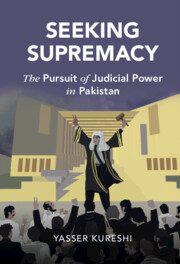Book contents
- Seeking Supremacy
- Cambridge Studies in Law and Society
- Seeking Supremacy
- Copyright page
- Dedication
- Contents
- Figures
- Tables
- Acknowledgements
- Introduction
- Chapter One The Judiciary, Rule of Law and the Military
- Chapter Two The Loyal Court (1947–1977)
- Chapter Three The Controlled Court (1977–1999, Part 1)
- Chapter Four Between the Barracks and the Bar (1977–1999, Part 2)
- Chapter Five The Confrontational Court (1999–2017)
- Chapter Six Epilogue
- Chapter Seven Conclusion and Comparative Perspectives
- Appendix: Structure of the Pakistani Judiciary
- References
- Index
- Cambridge Studies in Law and Society
Chapter Four - Between the Barracks and the Bar (1977–1999, Part 2)
A Judiciary in Transition
Published online by Cambridge University Press: 08 September 2022
- Seeking Supremacy
- Cambridge Studies in Law and Society
- Seeking Supremacy
- Copyright page
- Dedication
- Contents
- Figures
- Tables
- Acknowledgements
- Introduction
- Chapter One The Judiciary, Rule of Law and the Military
- Chapter Two The Loyal Court (1947–1977)
- Chapter Three The Controlled Court (1977–1999, Part 1)
- Chapter Four Between the Barracks and the Bar (1977–1999, Part 2)
- Chapter Five The Confrontational Court (1999–2017)
- Chapter Six Epilogue
- Chapter Seven Conclusion and Comparative Perspectives
- Appendix: Structure of the Pakistani Judiciary
- References
- Index
- Cambridge Studies in Law and Society
Summary
In this chapter, I seek to explain the trajectory outlined in Chapter 3. I first show that regime-related factors, namely the prevailing political configuration and the authority and influence of the military, did play a role in shaping the judiciary’s military-related jurisprudence, but they cannot alone explain the incremental shift in the approach of the judiciary over the course of this period, and the transformation of the role the judiciary sought to play in the political system. I then argue that the incremental shift in the judiciary towards increased independence from the military and expansion and promotion of its own jurisdiction was linked to a change in the audiences that shaped legal and policy preferences within the judiciary during this period. The military’s institutional interlinkages with the judiciary diminished, and the judiciary’s interlinkages with the politically active bar of professional lawyers grew, which reshaped the norms and preferences of the judiciary. It is important to point out that this shift took place gradually, and thus there was an institutional lag before the effects of this shift were fully realized, which will become apparent in Chapter 5. However, without understanding these shifts it would be difficult to explain the changing approach of the judiciary towards the military over the course of this twenty-year period. I use a combination of sociological data on judges, archival information on judicial appointments and bar association politics, and interviews with judges and lawyers to trace this gradual but impactful shift.
- Type
- Chapter
- Information
- Seeking SupremacyThe Pursuit of Judicial Power in Pakistan, pp. 111 - 152Publisher: Cambridge University PressPrint publication year: 2022

